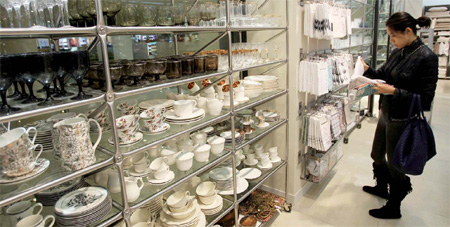Home improvement
Updated: 2011-11-04 08:55
By Yao Jing (China Daily)
|
|||||||||
|
Spanish brand ZARA is targeting trendy customers in China with its home products. Wang Jing / China Daily |
A taste for the good things in life is feeding China's burgeoning home decoration market
Someone once described ZARA, the clothing and accessories retailer, as "possibly the most innovative and devastating retailer in the world". That accolade came from someone who knows a thing or two about retailing, Daniel Piette, who is in charge of investment funds at French luxury major Moet Hennessy Louis Vuitton. One remarkable thing about ZARA is that it built its business with very little advertising. Now the company, by now familiar to many Chinese consumers, is trying to translate its successes with clothing in China by moving into the field of home products here.
ZARA, from Spain, is not alone among big foreign or Taiwan-based home decorating and household goods retailers looking to cash in on a market awash with cashed up, fashion-conscious buyers, particularly in the midst of a real estate boom, even if that is now cooling.
| ||||
ZARA HOME opened its second store in Beijing at Solana Lifestyle Shopping Park in September, after opening one in The Place shopping center in August, targeting trendy customers and home decorating enthusiasts.
"China is a great market for us and we were looking to find the perfect place and moment," says a spokesperson for the Chinese operation of Inditex, ZARA's parent company.
The Solana store, about twice as big as the 130-square-meter store at The Place, is ZARA HOME's 300th store worldwide.
They are located in fashionable shopping areas and medium- and high-end department stores. Harbor House, an interior decorating brand, MUJI, a retailer that sells household and consumer goods, and HOLA Home Furnishing Store are close neighbors.
The outlets often specialize in tableware, glassware, home accessories and furniture. Other products include textile products, such as bedding, upholstery, sofas, carpet, and linen.
"Our target customers are people who love fashion and decoration," Inditex China's spokesperson says.
"We have two different collections launching each year and we follow the fashion trends. We believe in the easy home update, and hope to provide a different look for a home each season."
It opened its third store in China, in Guangzhou, at the end of September and the fourth in Tianjin last month.
According to CTR Market Research of Beijing, advertising revenue of the nine interior decorating magazines it surveys reached 341 million yuan ($53.7 million, 39.1 million euros) in the first eight months of this year, up 16 percent from 2010. And the publicity campaigns launched by retailers, such as ZARA HOME and Harbour House, amid the growing market will likely contribute to the growth in advertising revenue.
In 2004 HOLA Home Furnishing Store opened its first outlet in Shanghai. Since then it has opened 27 stores in developed cities including Beijing, Shenzhen, Chengdu, Dalian and Hangzhou. By 2014 it will have between 50 and 55 outlets.
"We have more than 2 million registered members on the mainland," says Tong Zhixiang, CEO of Test Rite Group, the parent company of HOLA.
"Our rapid expansion is due to the rise of the Chinese consumer market and the improvement in people's lifestyle tastes."
The store used to go by the Chinese name HOLA Teliwu on the mainland, but that was changed to HOLA, Spanish for hello, to bring it into line with the name used in Taiwan.
"It is also our brand's integration strategy to further explore the potential Chinese market," Tong says. "We are agents of various brands and we have an international purchasing team. But only 10 percent of products sold in the outlets are our own. I hope the number will rise to 30 to 40 percent in three years."
Sales revenue for the company was $1.1 billion(803.4 million euros) last year, increasing by 13 percent from 2009," Tong says.
"We aim to keep double-digit growth this year, and the actual sales on the mainland account for 10 percent of total revenue."
In addition to increasing the number of outlets, HOLA is introducing online stores as well as mail order in major cities.
Tong says HOLA's most popular items include tableware, bedding and storage. It also sells to foreign traders such as Walmart.
"Our main customers are female, both young and mature. We not only provide stylish decorating products, but also offer customers interior decoration ideas as well as updates on the latest trends and information in this field."
HOLA has a free membership scheme that offers discounts and other incentives.
One member, Dong Hong, 53, went to the Beijing Jin Si Ji store to pick up a pink shopping bag that she was awarded after making purchases valued at more than 500 yuan.
"I work nearby. When I'm free I often come here to see if there is anything new. My 27-year-old daughter and I consider it more stylish than some local stores."
Dong spent 169 yuan on a music crystal ball as a birthday gift for a colleague and about 500 yuan for cosmetics two months ago, entitling her to go into a lottery draw.
Meng Pu, an interior designer and former editor-in-chief of Better Homes and Gardens, says foreign brands have been quick on the uptake in the interior decorating industry. While Chinese brands excel in manufacturing, she says, they are weak in design and the ability to follow through with sales and marketing.
Harbor House, based in Hangzhou, Zhejiang province, started in 2008 and has opened 15 outlets in China, the latest over 1,740 square meters in Shenyang, Liaoning province, last month.
"We are familiar with the changes in the home decorating industry in the US," says Ji Qing, general manager of Harbor House. "Seeing the rapid development of real estate in China in 2007, we saw the chance for interior decoration."
Ji regards interior decorating as the third retail wave that has swept over China from overseas in recent years, the first two being clothing and cosmetics.
"We pay attention to the niche market and focus on simple, American-style leisure products. Ninety-five percent of our goods are produced in China by our contracted producers, while we focus on designing and planning.
"Although our sales volume in China is trifling compared with our performance in the US, we have had 100 percent year-on-year increases in the past three and a half years."
Revenue in the company's flagship store in Beijing Shin Kong Place is as high as 3 million yuan or so a month, she says, and revenue to September was already 120 percent higher than last year.
Harbor House's target market is 25- to 45-year-old white collar workers with a house of more than 100 square meters.
"They have a better understanding of foreign decorating styles. We also attract interior designers," Ji says.
Meng says some of her clients, especially those who have experience living abroad aged between 35 to 50, are keen on Harbor House's simple style.
"It is very convenient for clients who are not familiar with home decorating as they have model rooms representing an overall arrangement. In addition, there is a lot of scope for their products when it comes to matching them with other brands' furniture and accessories."
One of Meng's clients, surnamed Wang, 45, who works in a bank in Beijing, worked in the US for 13 years.
He spent more than 300,000 yuan in Harbor House for his 400-square-meter villa in Shunyi district in Beijing two years ago.
"I like its sofas, beds and interior decorations," he says. "They are tidy and simple. Even now I often go to the stores at Shin Kong Place and Financial Street to buy paintings, lamps and lanterns and other small items. Last month I brought back some plastic flowers that cost about 2,000 yuan."
Harbor House says it will open stores in more than 30 cities in the next two to three years. It also plans to increase the present 8 percent e-commerce sales turnover to 30 percent in the near future. Children's household items will be introduced within a year.
MUJI, with 34 stores in China, has mapped out expansion plans too. It will double the pace of its expansion from next year but will stick to design minimalism, emphasize recycling and avoiding waste in production and packaging.
In the Chinese market, says Yuki Yamamoto, business director of MUJI Shanghai Co Ltd, it will also promote special products, such as bedding accustomed to Chinese people's size, and products appropriate for China's voltage.
Ji Qing says of the home decorating industry: "We each have distinguished features and we are almost at the same price level. People admire fashionable products and have the money to do so. It is a good chance for us to lead the ripening home furnishing retail market into an active one."














